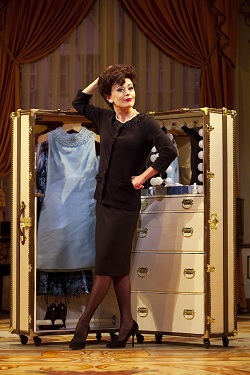
Dedicated fans of the great, late Judy Garland are likely to a feel a thrill at seeing their ill-fated idol briefly brought back to life in End of the Rainbow. Tracie Bennett blossoms as the Judy who is unknowingly living the last months of her life while Michael Cumpsty makes for a sympathetic complement to her floating flourish, but they are the only two flowers to hold their color in this otherwise wilting arrangement.
Bennett enters the stage as the undisputed Judy Garland, unconcerned with hitting the marks of an impersonation but rather focused on evading the jaws of addiction and self-destruction that will eventually consume her. She moves naturally, breathing Judy's breath, moving Judy's body, bouncing with the compulsive energy of a performer that finds it near impossible to allow herself to be "off."
What Ms. Bennett accomplishes is far greater than a tribute enactment; it is a performance independent in its own greatness and deeply marked with some genuinely uncomfortable moments of hard, ugly reality. Michael Cumpsty provides a solid support to Bennett's Judy in the role of Anthony, her once-spurned but ever-devoted pianist. Cumpsty works the arc of his role well, revealing new layers in time and living in the fan-fantasy position of the piece, lastly offering the solace that would have undoubtedly been the dream of many of her adoring followers. On the other side of the scale, Tom Pelphrey's performance as Mickey Deans is so focused on subtly hinting that the character is interested solely in Judy's fame and potential fortune that there is little else to be said of him; the rest is just non-incremental yelling.
Playwright Peter Quilter seems to have written a posthumous apology to Ms. Garland with this play, asking for forgiveness on behalf of those who reveled in her eccentric behaviors and shameless insanities while ignoring the sickness beneath the often amusing symptoms. She was prized for her voice but also praised for her antics; the finger-pointing is self-inclusive but does not make for captivating or compelling drama. This guilt, or play at guilt, confines the work to the mood of a funeral dirge and, despite Bennett's stunning contribution, never allows the piece to live before it dies. Director Terry Johnson is unable to pull its tires out of the mud, and though William Dudley's scenic design is beautiful and fittingly functional, it too is trapped in a monotonous rhythm that the play never successfully escapes. Ultimately it is this sense of stagnation that kills the play before Judy herself has a chance to get to the end of her rainbow.
The merits of Ms. Bennett's acting alone would warrant buying a ticket to this production, but those looking for something more than a singular performance will likely find themselves clicking their heels together part way through the second act.
